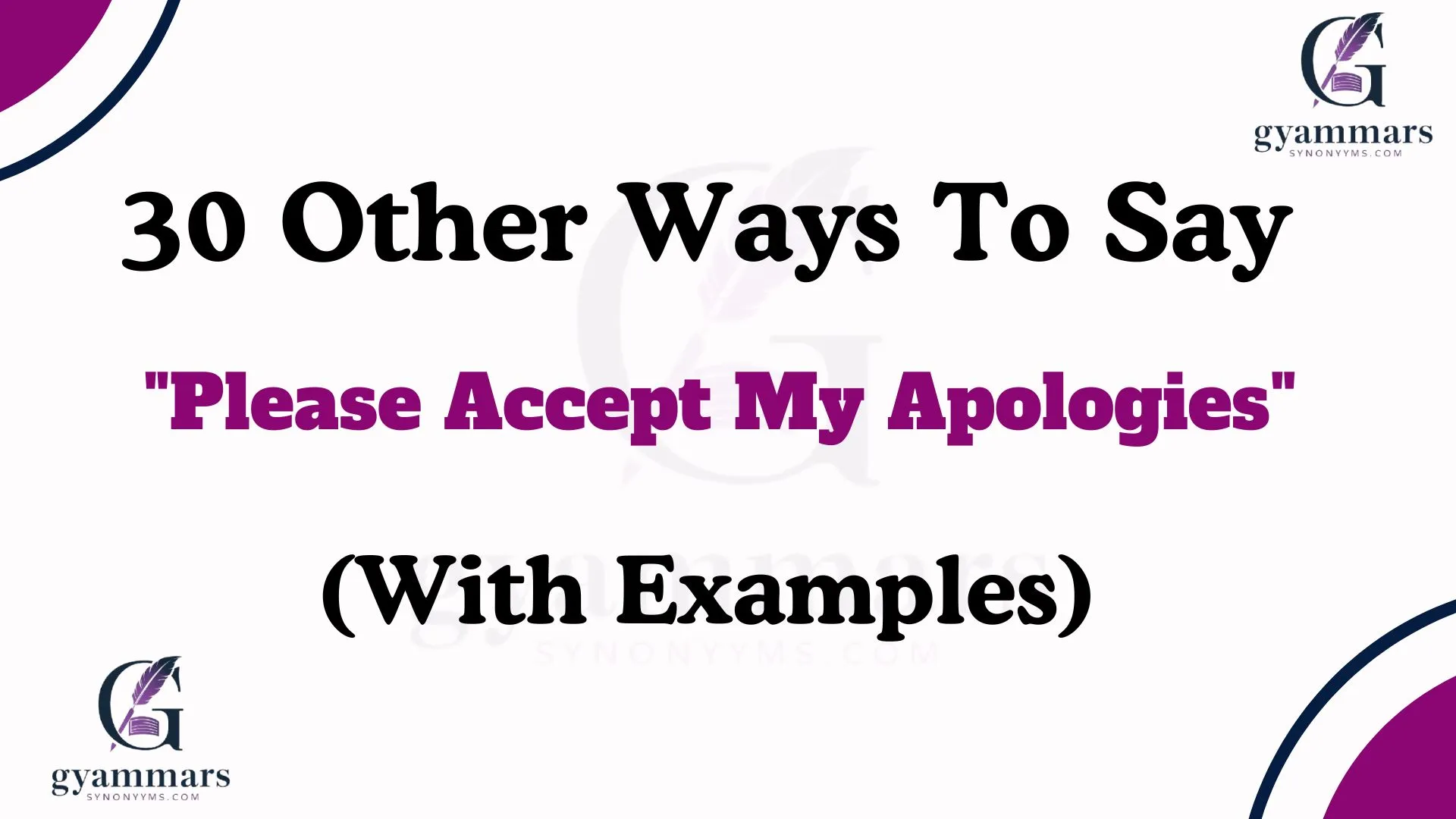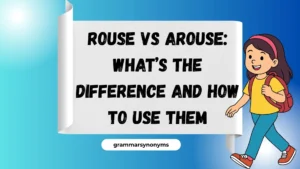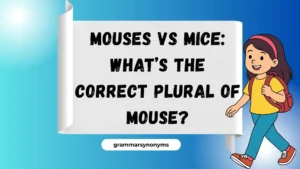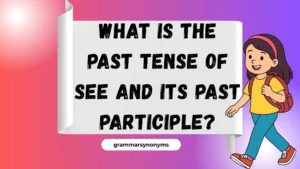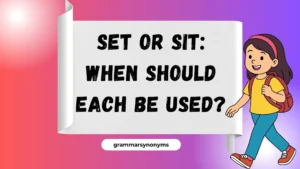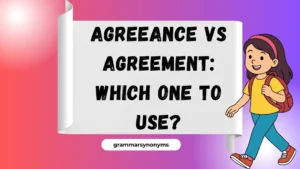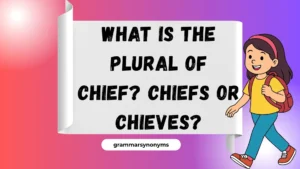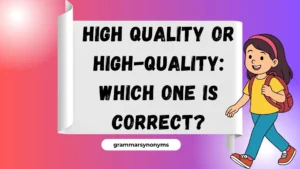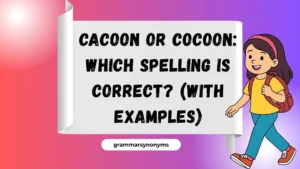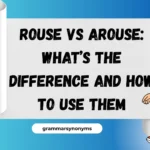We all know that words have a significant impact. Whether we’re mending a relationship, making amends, or simply expressing regret, the way we apologize matters. Sometimes, saying “please accept my apologies” might feel too formal or impersonal.
By using different expressions, you can convey your remorse more sincerely and thoughtfully. Below are 30 alternative ways to say “please accept my apologies,” each offering a unique tone or sentiment. Let’s explore how these alternatives can make your message feel more personal and meaningful.
What Does “Please Accept My Apologies” Mean?
“Please accept my apologies” is a formal way to express regret or sorrow for something that has gone wrong or hurt someone. It is a polite and respectful way of acknowledging a mistake and asking for forgiveness. While it’s a standard apology, varying the phrasing can make the apology feel warmer, more genuine, or even more personal, depending on the situation.
Is It Professional/Polite to Say “Please Accept My Apologies”?
Yes, “please accept my apologies” is professional and polite, especially in formal or business settings. It is considered respectful, though it can sometimes sound distant or detached. Depending on the relationship or the context, you might want to use different phrases to show more empathy or warmth.
Pros and Cons of “Please Accept My Apologies”
Pros:
It’s highly suitable for formal communication. It’s respectful and polite, avoiding sounding accusatory or defensive.
Cons:
It can sound impersonal, especially in more intimate or informal settings. It might feel too stiff and formal when dealing with close friends or loved ones.
Synonyms For “Please Accept My Apologies”
- I’m Truly Sorry
- I Owe You an Apology
- I Regret My Actions
- Please Forgive Me
- I’m So Sorry for the Inconvenience
- I Want to Make It Right
- I’m Sorry for Letting You Down
- I Was Wrong, and I’m Sorry
- I Apologize for Any Hurt I’ve Caused
- Please Accept My Sincere Apologies
- I’m Deeply Sorry
- I Owe You an Apology, and I’m Grateful for Your Patience
- I’m Sorry for How Things Turned Out
- I Apologize for My Behavior
- I’m Sorry for My Mistake
- Please Accept My Apologies for the Confusion
- I Was Out of Line, and I’m Sorry
- I Apologize for the Misunderstanding
- I Regret the Way I Handled That
- I Apologize for Any Inconvenience I Caused
- I Didn’t Mean to Offend You, and I’m Sorry
- Please Forgive Me for What Happened
- I Apologize for Any Discomfort Caused
- I’m Sorry for the Trouble I’ve Caused
- Please Accept My Heartfelt Apologies
- I Apologize for the Miscommunication
- I Should Have Known Better, I’m Sorry
- I’m Sorry for the Inconvenience I Caused You
- I Truly Regret What Happened
- I Hope You Can Find It in Your Heart to Forgive Me
1. I’m Truly Sorry
Definition: A heartfelt expression of regret, often used to show genuine emotion.
Explanation: This phrase conveys deep personal remorse. It’s less formal and more intimate, offering sincerity in an apology.
Scenario Example: “I’m truly sorry for missing your birthday party; I’ll make it up to you.”
Best Use: In close relationships or informal settings.
Tone: Warm and empathetic.
Additional Notes: Ideal for showing personal involvement in the mistake.
2. I Owe You an Apology
Definition: Acknowledges that an apology is deserved.
Explanation: This phrase emphasizes accountability and the need to make things right. It implies recognition that the person is owed a form of compensation for the wrong.
Scenario Example: “I owe you an apology for how I handled that situation.”
Best Use: In situations where you want to take full responsibility.
Tone: Honest and accountable.
Additional Notes: Strong for demonstrating maturity and responsibility.
3. I Regret My Actions
Definition: Expresses sorrow about specific actions.
Explanation: This phrase shows an understanding of the harm caused and reflects a sense of personal regret.
Scenario Example: “I regret my actions last night, and I hope we can talk things through.”
Best Use: When you want to highlight the actions rather than just the situation.
Tone: Reflective and serious.
Additional Notes: Ideal for showing deep remorse for your specific actions.
4. Please Forgive Me
Definition: Directly asks for forgiveness.
Explanation: This phrase makes a more vulnerable appeal, emphasizing the hope for reconciliation.
Scenario Example: “Please forgive me for how I acted at dinner last night.”
Best Use: When you’re seeking immediate forgiveness in a personal relationship.
Tone: Sincere and pleading.
Additional Notes: Shows emotional vulnerability and openness.
5. I’m So Sorry for the Inconvenience
Definition: A polite apology that acknowledges inconvenience caused.
Explanation: This phrase is often used in professional or customer service settings to convey regret for causing inconvenience.
Scenario Example: “I’m so sorry for the inconvenience I’ve caused with the delay.”
Best Use: Professional and business contexts.
Tone: Courteous and professional.
Additional Notes: A formal way to express regret without being overly personal.
6. I Want to Make It Right
Definition: Focuses on correcting the mistake.
Explanation: This phrase emphasizes your desire to repair the situation, showing that you’re proactive in finding a solution.
Scenario Example: “I want to make it right after the misunderstanding we had.”
Best Use: When you’re focused on resolution and fixing things.
Tone: Solution-oriented and sincere.
Additional Notes: Ideal for situations where action is more important than words.
7. I’m Sorry for Letting You Down
Definition: Acknowledges failing someone’s expectations.
Explanation: This phrase conveys personal responsibility for disappointing someone and acknowledges the effect on the relationship.
Scenario Example: “I’m sorry for letting you down during the project. I’ll do better next time.”
Best Use: In both personal and professional situations where someone’s trust or expectations were not met.
Tone: Regretful and apologetic.
Additional Notes: Shows recognition of the impact your actions had on others.
8. I Was Wrong, and I’m Sorry
Definition: A straightforward admission of fault.
Explanation: This phrase cuts straight to the point, clearly acknowledging that you were in the wrong and expressing regret.
Scenario Example: “I was wrong for raising my voice, and I’m sorry for that.”
Best Use: When you want to own up to a mistake directly.
Tone: Honest and straightforward.
Additional Notes: This is one of the most genuine and transparent ways to apologize.
9. I Apologize for Any Hurt I’ve Caused
Definition: A broader, more empathetic apology.
Explanation: This phrase shows awareness of the emotional impact of your actions and expresses regret for the pain caused.
Scenario Example: “I apologize for any hurt I’ve caused with my words.”
Best Use: When acknowledging that your actions might have affected someone’s emotions.
Tone: Sensitive and empathetic.
Additional Notes: It acknowledges emotional hurt rather than just a practical mistake.
10. Please Accept My Sincere Apologies
Definition: A formal apology that conveys genuine remorse.
Explanation: This is a more formal way to apologize, typically used in professional or official contexts. It suggests that the apology is both genuine and important.
Scenario Example: “Please accept my sincere apologies for the misunderstanding during the meeting.”
Best Use: In formal settings, such as business or professional interactions.
Tone: Formal and respectful.
Additional Notes: Very effective when conveying respect and seriousness.
11. I’m Deeply Sorry
Definition: A strong expression of regret, indicating deep remorse.
Explanation: This phrase emphasizes that you feel deeply about the mistake and the consequences. It suggests that the apology is heartfelt and comes from a place of genuine sorrow.
Scenario Example: “I’m deeply sorry for missing your special day. It won’t happen again.”
Best Use: When you want to emphasize the depth of your regret.
Tone: Sincere and heartfelt.
Additional Notes: Great for showing emotional depth and personal involvement.
12. I Owe You an Apology, and I’m Grateful for Your Patience
Definition: Acknowledges fault while also showing gratitude.
Explanation: This phrase not only admits a mistake but also expresses appreciation for the other person’s understanding.
Scenario Example: “I owe you an apology for the delay, and I’m grateful for your patience.”
Best Use: When you want to show both accountability and appreciation.
Tone: Appreciative and responsible.
Additional Notes: Ideal when the other person has been tolerant or understanding.
13. I’m Sorry for How Things Turned Out
Definition: A general apology for a situation that didn’t go as planned.
Explanation: This phrase covers situations where things didn’t go right, but it’s less focused on the specific action and more on the outcome.
Scenario Example: “I’m sorry for how things turned out with the project, but I’ll work harder next time.”
Best Use: When the outcome of an event, rather than a single action, went wrong.
Tone: Regretful but hopeful.
Additional Notes: This phrase can be used when the situation was beyond anyone’s control, but you still want to acknowledge the disappointment.
14. I Apologize for My Behavior
Definition: A direct acknowledgment of one’s conduct.
Explanation: This phrase specifically targets one’s behavior rather than the situation, making it ideal for instances where personal conduct is to blame.
Scenario Example: “I apologize for my behavior last night. I should have been more considerate.”
Best Use: When you want to acknowledge a specific action or attitude.
Tone: Humble and self-aware.
Additional Notes: Strong when admitting to poor actions or attitudes.
15. I’m Sorry for My Mistake
Definition: A straightforward and clear apology for a specific error.
Explanation: This simple apology focuses on the error itself, showing direct accountability without any excuses.
Scenario Example: “I’m sorry for my mistake during the presentation. I’ll make sure it doesn’t happen again.”
Best Use: In both professional and personal settings when you want to own up to a specific mistake.
Tone: Clear and straightforward.
Additional Notes: This approach is honest and no-nonsense.
16. Please Accept My Apologies for the Confusion
Definition: A polite way to apologize for any misunderstanding.
Explanation: This phrase specifically addresses miscommunication or confusion, showing understanding of how it impacted the situation.
Scenario Example: “Please accept my apologies for the confusion about the meeting time.”
Best Use: When misunderstandings or unclear information have caused issues.
Tone: Professional and polite.
Additional Notes: Very suitable for addressing miscommunication in work or professional contexts.
17. I Was Out of Line, and I’m Sorry
Definition: Acknowledges overstepping boundaries or acting inappropriately.
Explanation: This phrase is direct and indicates that your actions were inappropriate.
Scenario Example: “I was out of line with my comments, and I’m sorry for making you feel uncomfortable.”
Best Use: When you want to admit to overstepping or being disrespectful.
Tone: Apologetic and sincere.
Additional Notes: Works well when apologizing for words or actions that were inconsiderate or inappropriate.
18. I Apologize for the Misunderstanding
Definition: A formal apology for a confusion or misinterpretation.
Explanation: This is a diplomatic way to apologize for any misunderstanding that has taken place, showing that you acknowledge the confusion.
Scenario Example: “I apologize for the misunderstanding regarding the email.”
Best Use: In situations where there was a clear misinterpretation or confusion.
Tone: Polite and formal.
Additional Notes: This is ideal when both parties may be at fault or when the misunderstanding was minor.
19. I Regret the Way I Handled That
Definition: Expresses regret over your approach to a situation.
Explanation: This phrase shows that you recognize a poor approach and regret how it was managed.
Scenario Example: “I regret the way I handled that situation; I should have been more patient.”
Best Use: When you’re focusing on how the situation was managed, not just the outcome.
Tone: Self-reflective and regretful.
Additional Notes: This expression is great for showing a willingness to learn from past mistakes.
20. I Apologize for Any Inconvenience I Caused
Definition: A polite way to acknowledge any trouble you may have caused.
Explanation: This phrase is commonly used in formal or professional settings to apologize for causing trouble or inconvenience.
Scenario Example: “I apologize for any inconvenience I caused with the changes to the schedule.”
Best Use: In professional or service-oriented contexts where inconvenience may have occurred.
Tone: Formal and respectful.
Additional Notes: A common phrase in customer service and business settings.
21. I Didn’t Mean to Offend You, and I’m Sorry
Definition: Acknowledges that you unintentionally hurt someone.
Explanation: This phrase shows regret for causing offense, clarifying that the intention was not to upset the other person.
Scenario Example: “I didn’t mean to offend you, and I’m sorry if my words hurt you.”
Best Use: When you want to assure the other person that there was no malicious intent.
Tone: Apologetic and sincere.
Additional Notes: Works well when the offense was unintentional but still impactful.
22. Please Forgive Me for What Happened
Definition: A direct plea for forgiveness.
Explanation: This phrase is a straightforward and humble request for forgiveness while acknowledging that something went wrong.
Scenario Example: “Please forgive me for what happened at the meeting yesterday.”
Best Use: When you want to ask for forgiveness after a specific incident.
Tone: Humble and remorseful.
Additional Notes: This phrase is ideal when you’re seeking direct forgiveness and hoping to move forward.
23. I Apologize for Any Discomfort Caused
Definition: A polite way of acknowledging that your actions may have caused discomfort.
Explanation: This phrase is often used to address any awkwardness or emotional discomfort.
Scenario Example: “I apologize for any discomfort caused during our conversation.”
Best Use: When addressing emotional or physical discomfort in professional or personal situations.
Tone: Polite and empathetic.
Additional Notes: This works well in situations involving sensitive topics or minor misunderstandings.
24. I’m Sorry for the Trouble I’ve Caused
Definition: A polite way to admit causing trouble.
Explanation: This phrase conveys that you understand the inconvenience or difficulty you may have brought upon someone.
Scenario Example: “I’m sorry for the trouble I’ve caused with the sudden changes to the schedule.”
Best Use: When acknowledging that your actions have caused complications or problems.
Tone: Sincere and regretful.
Additional Notes: Ideal for situations where the other person has to deal with the consequences of your actions.
25. Please Accept My Heartfelt Apologies
Definition: A warm, sincere apology.
Explanation: This phrase emphasizes the sincerity of the apology and the genuine feeling behind it.
Scenario Example: “Please accept my heartfelt apologies for the confusion earlier.”
Best Use: When you want to show that your apology is genuine and comes from the heart.
Tone: Warm and empathetic.
Additional Notes: Works well for emotional situations where you want to convey deep care.
26. I Apologize for the Miscommunication
Definition: A specific acknowledgment of any confusion caused.
Explanation: This phrase is great for situations where information wasn’t conveyed properly, leading to confusion or misunderstanding.
Scenario Example: “I apologize for the miscommunication about the project details.”
Best Use: When the problem is based on communication issues or unclear instructions.
Tone: Professional and considerate.
Additional Notes: Ideal for resolving any workplace misunderstandings or misunderstandings in social situations.
27. I Should Have Known Better, I’m Sorry
Definition: Admitting you should have acted differently.
Explanation: This phrase expresses regret while acknowledging that you should have known how your actions might affect someone.
Scenario Example: “I should have known better, I’m sorry for not listening more carefully.”
Best Use: When you feel that you should have anticipated the consequences of your actions.
Tone: Reflective and apologetic.
Additional Notes: Perfect for when you realize you made an avoidable mistake due to a lack of judgment.
28. I’m Sorry for the Inconvenience I Caused You
Definition: A polite and formal way of apologizing for causing disruption.
Explanation: This phrase is appropriate for acknowledging that your actions have disrupted someone’s routine or caused problems.
Scenario Example: “I’m sorry for the inconvenience I caused you with my late reply.”
Best Use: In both professional and personal settings, when you’ve caused an inconvenience to someone.
Tone: Formal and considerate.
Additional Notes: Often used in business contexts or customer service when an issue has occurred.
29. I Truly Regret What Happened
Definition: A serious acknowledgment of regret.
Explanation: This phrase conveys that you genuinely feel regret about the incident, not just a casual apology.
Scenario Example: “I truly regret what happened last night and the effect it had on you.”
Best Use: When you want to express genuine remorse and show that you understand the situation’s seriousness.
Tone: Deeply regretful and sincere.
Additional Notes: Works well in more emotional contexts where the impact was significant.
30. I Hope You Can Find It in Your Heart to Forgive Me
Definition: A plea for forgiveness with an emphasis on emotional reconciliation.
Explanation: This phrase expresses both regret and a desire for emotional healing.
Scenario Example: “I hope you can find it in your heart to forgive me for my actions.”
Best Use: When you want to show that you genuinely care about the relationship and hope to move past the issue.
Tone: Humble and emotionally open.
Additional Notes: This phrase is great for situations where emotional healing is needed.
Conclusion
Finding the right words when apologizing can make a huge difference in mending relationships and showing that you truly care. Whether the situation was caused by a simple mistake or a deeper issue, expressing genuine regret and acknowledging the consequences of your actions is key to rebuilding trust and fostering understanding. These 30 alternatives give you a range of options to match the tone and context of your apology, from sincere and formal to casual and heartfelt. Whatever the scenario, using thoughtful language ensures that your apology is both meaningful and well-received.
FAQs
1. What is the best way to say “Please Accept My Apologies”?
The best alternative depends on the context. For formal situations, you might say, “Please accept my sincere apologies.” In casual or personal scenarios, you can try phrases like “I’m truly sorry” or “I didn’t mean to hurt you, and I apologize.” Each alternative conveys sincerity, but the tone and level of formality vary.
2. Can I use “Please accept my apologies” in a professional setting?
Yes, “Please accept my apologies” is both professional and polite. It’s ideal for situations where you want to acknowledge a mistake or inconvenience in a respectful and formal manner. For example, in business emails or customer service scenarios, this phrase works well to maintain a professional tone.
3. How do I apologize for something I didn’t mean to do?
If you unintentionally hurt someone, try saying, “I didn’t mean to offend you, and I’m sorry.” This approach acknowledges that your actions were not intentional while expressing regret for their effect. It’s a compassionate and understanding way to apologize.
4. Is it okay to apologize using “I hope you can find it in your heart to forgive me”?
Yes, this phrase is emotionally open and humble. It works well in situations where you’ve hurt someone deeply and are seeking reconciliation. However, make sure it’s used appropriately, as it might be too personal for certain formal situations.
5. Should I always use “I apologize” in an apology?
Not necessarily. While “I apologize” is common and formal, there are many other ways to express regret. Alternatives like “I’m sorry” or “Please forgive me” can feel more personal and sincere, depending on the situation. Tailor your wording to fit the relationship and context.

“Emma Rose at Grammar Synonyms is your go-to expert for everything related to language and expression. Whether you’re refining your grammar, searching for the perfect synonym, or looking for creative ways to improve your writing, Emma Rose provides the tools and inspiration you need. With a wide range of resources designed to elevate your communication, Grammar Synonyms helps you find just the right words to make every sentence shine.
